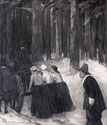
How the Women Went from Dover
 “How the Women Went from Dover” was written in 1883 for the Atlantic Monthly, to which Whittier was a regular contributor. Although Whittier attributed the women’s salvation to the constable of Salisbury under the influence of the Mayor Robert Pike, it was later found that William Barefoote, who arrived on the scene after the women had been beaten, persuaded the constable to appoint him deputy to take the women across the river to Newbury. Once he was deputy, Barefoote sent them by boat to a Quaker friend in Kittery, ME. (Woodwell 456)
“How the Women Went from Dover” was written in 1883 for the Atlantic Monthly, to which Whittier was a regular contributor. Although Whittier attributed the women’s salvation to the constable of Salisbury under the influence of the Mayor Robert Pike, it was later found that William Barefoote, who arrived on the scene after the women had been beaten, persuaded the constable to appoint him deputy to take the women across the river to Newbury. Once he was deputy, Barefoote sent them by boat to a Quaker friend in Kittery, ME. (Woodwell 456)
This was based on a 1662 warrant by the Major Richard Waldron of Dover “To the constables of Dover, Hampton, Salisbury, Newbury, Rowley, Ipswich, Wenham, Lynn, Boston, Roxbury, Dedham, and until these vagabond Quakers are carried out of this jurisdiction.”
The warrant ordered the constables to tie the women to the back of a cart and drive the cart through the town, whipping them on their naked backs in each town. In the poem, they got as far as Salisbury where the constable refused to beat them.
The women begin their journey in a very cold Dover.
The tossing spray of Cocheco’s fall
Hardened to ice on its rocky wall,
As through Dover town in the chill, gray dawn,
Three women passed, at the car-tail drawn!
Bared to the waist, for the north wind’s grip
And keener sting of the constable’s whip,
The blood that followed each hissing blow
Froze as it sprinkled the winter snow.
When they are beaten in Hampton, a young girl pleads for them, and a woman tries to give them milk, and gets hit for her attempt. They pass through the woods of Seabrook to Salisbury.
With shame in his eye, and wrath on his lip
***
The Salisbury constable dropped his whip.
“This warrant means murder foul and red;
Cursed is he who serves it, he said.He read the warrant: “These convey
From our precincts; at every town on the way
Give each ten lashes.” “God judge the brute!
I tread his order under my foot!“Cut loose these poor ones and let them go;
Come what will of it, all men shall know
No warrant is good, though backed by the Crown,
For whipping women in Salisbury town!”
Full text of "How the Women Went from Dover"
